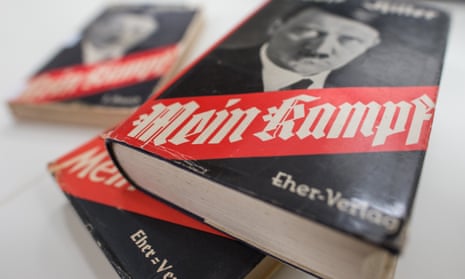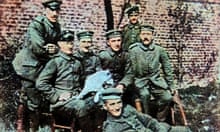How do you solve a problem like Mein Kampf? Since 1945 the solution in Germany has been to prevent the printing of it. The presence of millions of legacy copies, combined with the liberty of the internet, meant that this unofficial ban was always imperfect. The symbolic nature of the book, however, meant that it was both understandable and, for a long time, entirely appropriate.
Yet the banning of the book also served to foster a myth – the myth that Mein Kampf carried a uniquely toxic message, conveyed in uniquely toxic language that could be quarantined off after 1945 and rendered harmless. Now, 70 years after Hitler’s death, the copyright that prevented its publication has expired and Germans have had to think hard about how to handle the prospect of its renewed availability. But 70 years of careful scholarship on Nazi Germany have also destroyed the myth that Mein Kampf can be isolated in this way. Rather, it has to be read as having been firmly anchored in the political, cultural and intellectual currents of its day. Neither Hitler nor his ugly ideas came from outside history – to the contrary, they were a product of it. Hitler can only be understood, it follows, if he is read as an author like any other.
It is therefore not only a pragmatic necessity but also an entirely suitable decision to republish Mein Kampf in the form of a new, scholarly but accessible, critical edition. For some years, a distinguished team from the Institute of Contemporary History in Munich has been labouring to do just that. The result is an exhaustively annotated 2,000 page book – currently only available in German – that seeks to contextualise, correct and contest – the fruits, one might say, of the team’s own long struggle against the lies, stupidity and cowardice of the original.
An extensive introduction outlines how the book came to be written and sets out ways in which we might approach it. Rather than read it line by line the editors explore the different genres that the text inhabits – political philosophy, autobiography, history – and outline some key themes. A broad argument coalesces, they suggest, around the topics of race, space, violence and dictatorship. While genocide is hardly pre-announced, it is there as a logical possibility.
They are particularly keen to bury the theory that Mein Kampf was dictated – either to Rudolf Hess or to another of Hitler’s fellow inmates in prison following the Munich putsch – and emphasise instead that various sections first appeared as newspaper articles contributed by Hitler to the fledgling Nazi press. This reminds us that, one way or another, rather more people became familiar with the book’s contents than Germans later liked to admit.
What, though, did German people make of it? How might they have understood it better, or maybe differently, to people in different countries, and since? The edition is at its most valuable when it focuses on Mein Kampf as an intervention in the politics of its own time. Footnotes explain passing references to historical events, to now obscure contemporaries or to the daily news agenda of the 1920s – thus Hitler’s rants against the revolutionaries of 1918-1919, for example, are contextualised with short biographical footnotes on Kurt Eisner, Rosa Luxemburg and Karl Liebknecht.
But Hitler’s text is also full of commonplace literary allusions, together with phrases and arguments recycled from a diverse range of familiar 19th- and early-20th century texts. War, we learn, is the pursuit of politics by other means – as the apparatus reminds us, Hitler is plundering the military theorist Carl von Clausewitz. Similarly, the editors explain that Hitler’s language of struggle derives from the social Darwinist thinking of the 19th century. Blink and you miss it, but Shakespeare’s “to be or not to be” is in there too. There is scarcely an original idea in a book that distills, adapts and vulgarises broad strands of the modern German (and European) intellectual tradition.
Yet Mein Kampf still provokes fear. That fear is shaped by memories that define German political culture, and what it means to move through the world as a German, to this day. Even the manner in which the footnotes surround the text suggests, unmistakably, a desire to contain it on the page. The project treats the book not only as an intervention in the politics of its own time, but as a potential intervention in ours. A palpable fear of the contemporary far right underpins the obsessive correction of errors, the challenging of antisemitic stereotypes, and the countering of false representations of history. So when Hitler claims that the Jews were war profiteers, for example, the editors politely point out that most Jews were as impoverished as everyone else. The bile is relentless and so, therefore, are the corresponding footnotes.
Is it possible to argue with Hitler? Correcting his many factual errors is easy enough, as is the refutation of his absurd antisemitic conspiracy theories. But Mein Kampf is a far more slippery text than that, and therein lies the challenge. A huge variety of languages course through it – it resonates not only with a multitude of vicious antisemitic registers but also with a range of decidedly more mainstream nationalist and conservative polemics that are harder to untangle. Hitler’s accounts of the “encirclement” of Germany before the first world war are a case in point: such arguments echo through some conventional, perfectly legitimate conservative historiography to this day. Where the footnotes contest these they create an illusion of objective authority, underpinned by the prestige of German mandarin academic culture, whereas in reality they are taking subjective positions on matters of historical debate, like everyone else.
What impact will the republication have? There have been no shortage of lazy attempts to juxtapose the republication of Mein Kampf with the rising political tensions that have attended the massive influx of refugees into Germany. Such arguments stand within a long, undistinguished tradition of casting every act of everyday racism in Germany as evidence that the country stands permanently on the brink of the Fourth Reich.
But if we are looking for the drift towards nationalist authoritarianism we should be looking at Poland; if we are concerned about populist nationalism the more obvious danger lies in France. Even the phenomenon of Pegida is too easily interpreted against the background of Germany’s Nazi past, whereas in reality its ugly blend of nationalism, Islamophobia and hostility to multiculturalism makes more sense when examined alongside Ukip.
The point is not to suggest that Germany is now an oasis of decency in a desert of xenophobia. Rather, it is to underline that manifestations of far-right politics now draw on quite different sources to those that Hitler once did. Mein Kampf can now only really be read as history. This does not mean that this republication project did not matter, or that it was not important to be painstakingly accurate. The symbolism of the book in Germany is still such that, had the team got it wrong, the potential for scandal was significant. By producing such a solid and sober edition, they have ensured that the ending of copyright has passed off with comparatively little fuss. The project thus hopefully marks another milestone in the slow, inexorable fading of this hateful text into history.











Comments (…)
Sign in or create your Guardian account to join the discussion